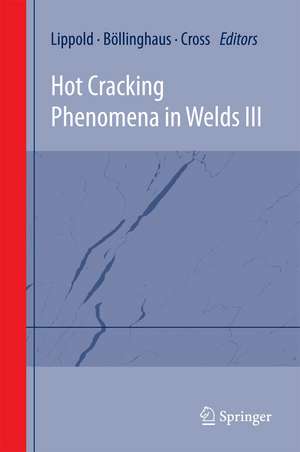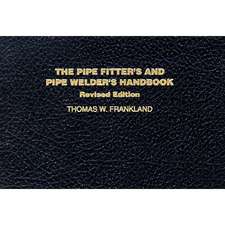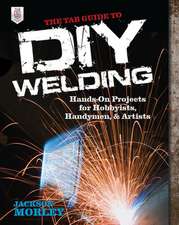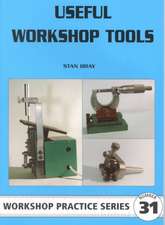Hot Cracking Phenomena in Welds III
Editat de John Lippold, Thomas Böllinghaus, Carl E. Crossen Limba Engleză Hardback – 6 mai 2011
| Toate formatele și edițiile | Preț | Express |
|---|---|---|
| Paperback (1) | 952.26 lei 6-8 săpt. | |
| Springer Berlin, Heidelberg – 23 aug 2016 | 952.26 lei 6-8 săpt. | |
| Hardback (1) | 958.38 lei 6-8 săpt. | |
| Springer Berlin, Heidelberg – 6 mai 2011 | 958.38 lei 6-8 săpt. |
Preț: 958.38 lei
Preț vechi: 1168.76 lei
-18% Nou
Puncte Express: 1438
Preț estimativ în valută:
183.39€ • 196.10$ • 152.90£
183.39€ • 196.10$ • 152.90£
Carte tipărită la comandă
Livrare economică 17 aprilie-01 mai
Preluare comenzi: 021 569.72.76
Specificații
ISBN-13: 9783642168635
ISBN-10: 3642168639
Pagini: 600
Ilustrații: XVIII, 439 p.
Dimensiuni: 155 x 235 x 30 mm
Greutate: 0.82 kg
Ediția:2011
Editura: Springer Berlin, Heidelberg
Colecția Springer
Locul publicării:Berlin, Heidelberg, Germany
ISBN-10: 3642168639
Pagini: 600
Ilustrații: XVIII, 439 p.
Dimensiuni: 155 x 235 x 30 mm
Greutate: 0.82 kg
Ediția:2011
Editura: Springer Berlin, Heidelberg
Colecția Springer
Locul publicării:Berlin, Heidelberg, Germany
Public țintă
ResearchTextul de pe ultima copertă
This is the third in a series of compendiums devoted to the subject of weld hot cracking. It contains 22 papers presented at the 3rd International Hot Cracking Workshop in Columbus, Ohio USA in March 2010. In the context of this workshop, the term “hot cracking” refers to elevated temperature cracking associated with either the weld metal or heat-affected zone. These hot cracking phenomena include weld solidification cracking, HAZ and weld metal liquation cracking, and ductility-dip cracking. The book is divided into three major sections based on material type; specifically aluminum alloys, steels, and nickel-base alloys. Each of these sections begins with a keynote paper from prominent researchers in the field: Dr. Sindo Kou from the University of Wisconsin, Dr. Thomas Böllinghaus from BAM and the University of Magdeburg, and Dr. John DuPont from Lehigh University. The papers contained within include the latest insight into the mechanisms associated with hot cracking in these materials and methods to prevent cracking through material selection, process modification, or other means. The three Hot Cracking Phenomena in Welds compendiums combined contain a total of 64 papers and represent the best collection of papers on the topic of hot cracking ever assembled.
Caracteristici
Reports state of the art in welding science Gives numerous individual solutions and helpful advice for welding engineers to avoid hot cracking in practice Presents high-level research results from leading scientists Includes supplementary material: sn.pub/extras







